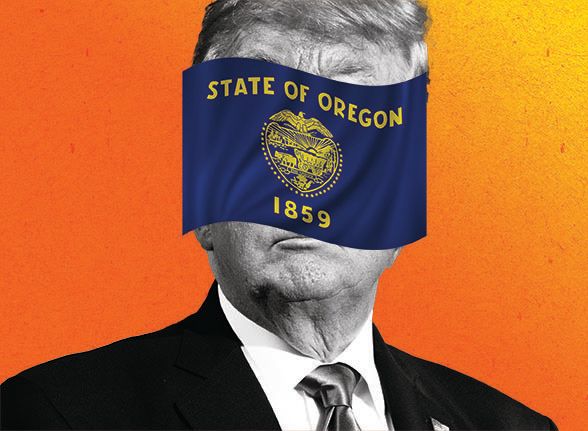Oregon Lawyers Have Spent Almost Four Years Suing the Trump Administration

In the nearly four-year span of Trump’s presidency, attorneys with the Oregon Department of Justice, led by Attorney General Ellen Rosenblum, have joined existing cases or filed suit against the Trump administration dozens of times.
Image: Shutterstock
Should Donald Trump lose his reelection bid this November, the lawyers who speak for Oregon in federal court will have a lot less to do. In the nearly four-year span of Trump’s presidency, attorneys with the Oregon Department of Justice, led by Attorney General Ellen Rosenblum, have joined existing cases or filed suit against the Trump administration dozens of times. Most often, Oregon is part of a well-connected crew of other left-leaning states—New York, Washington, California—who cosign each other’s legal filings.
This strategy of blue-state lawyers pooling resources against the federal government is wholly lifted from the playbook of Republican attorneys general during the Obama years, who tied up ambitious environmental initiatives in a series of legal battles. Here’s a closer look at four years of landmark losses and irenic victories.
Net Neutrality
(New York et al. v. FCC)
The Issue: Should the Trump administration be allowed to repeal Obama-era rules that require all internet service providers (looking at you, Comcast) to treat all web data equally, regardless of origin?
Verdict: Mixed. The US Court of Appeals in DC said the administration could roll back the rules—but couldn’t prevent states and municipalities from writing their own codes of conduct.
3-D-Printed Guns
(Washington et al. v. Trump)
The Issue: Trump’s administration wanted to allow the unlimited distribution on the internet of data files to create untraceable, undetectable
3-D-printed guns.
Verdict: Oregon and other states won round one, when US District Judge Robert Lasnik called the administration’s position “capricious and unlawful.” But the administration tried an end run via a rules adjustment, which prompted another, still-pending suit.
Travel Ban
(Washington et al. v. Trump)
The Issue: One of the very first flashpoints of the Trump era, when the administration banned entry to the country for those from a handful of Muslim-dominated countries.
Verdict: Trump won this one, courtesy of a 5–4 US Supreme Court decision authored by Chief Justice John Roberts. The president celebrated on brand: by tweeting with plenty of words in all-caps.
Immigration
(Washington v. Trump, New York v. Trump)
The Issue(s): Oregon was a part of one case to preserve the DREAM Act, which allows those brought to this country as children a path to citizenship, and another to prevent a citizenship question from being on the 2020 Census.
Verdict: Two big Supreme Court wins for Oregon
Reproductive Rights
(Oregon et al. v. Azar)
The Issue: Think your federally funded health care professional should be able to talk with you about abortion services, maybe even provide a referral? The administration begged to differ.
Verdict: A win for Trump at the appeals court level
The Environment
(California v. EPA)
The Issue: Anyone who has ever white-knuckled it behind the wheel in LA knows Californians love their automobiles. But they want them to be lean, green, and mandated fuel-efficient driving machines. The Trump administration would prefer otherwise.
Verdict: TBD: with the Washington DC Court of Appeals at press time
Police Brutality
(Rosenblum v. John Does 1–10, the US Department of Homeland Security, et al.)
The Issue: After Trump sent federal law enforcement agents to Portland this summer, ostensibly to quell protests supporting the Black Lives Matter movement, the AG’s office tried to kick them out, alleging that they’d violated Oregonians’ civil rights by seizing and detaining protesters for no reason.
Verdict: A win for Trump, when a federal judge turned down Rosenblum’s request for a temporary restraining order, saying the state lacked standing.




